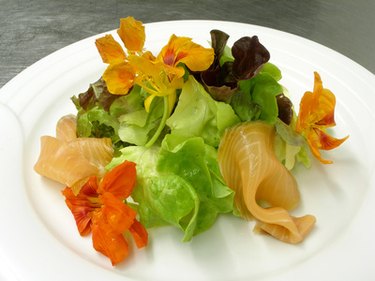
The kitchen is a breeding ground for a number of bacteria. This is because the kitchen provides the perfect environment for different types of bacteria to breed and thrive. The kitchen sink and the washing sponge are the worst culprits because they are usually damp, a condition that bacteria like. Cutting boards, countertops and even the refrigerator are other breeding hot spots for bacteria in the kitchen. This is a situation that causes incidences of food poisoning from eating contaminated food.
Salmonella
Video of the Day

Salmonella is a bacterium that is common in the kitchen. Salmonella is the genus name for a large family of bacteria with more than 2,500 types. These bacteria cause diseases in people and animals. Salmonella is transmitted to people through the ingestion of contaminated foods, which include meat, vegetables, cereal, contaminated water and eggs. When such contaminated foods are ingested by people, they risk contracting salmonellosis. Salmonella bacteria also cause typhoid fever. This occurs when the salmonella bacteria enter the gastrointestinal tract and breed in the liver, spleen or other organs. Symptoms of salmonella infection include diarrhea, vomiting, abdominal pain and nausea.
Video of the Day
Listeria
Listeria are a group of bacteria that thrive in the kitchen. They are found in contaminated food and are a cause of food poisoning. Listeria infection is particularly serious in pregnant women because it is capable of causing spontaneous abortion or miscarriage, premature birth and stillbirth. Listeria is also particularly serious in elderly people, children and in people whose immune systems have been compromised. Listeria have been found in large numbers in certain food like mold-ripened cheese.
E-coli
Escherichia coli (E. coli) is a type of bacterium that thrives in the intestines of people and animals. E. coli can be contracted from eating raw meat and meat products like hamburgers and from drinking raw milk. E. coli can also be contracted by not washing hands after handling raw meat and then using the unwashed hands to transfer the E. coli bacteria to other food. Another source of E. coli infection in the kitchen is using a work surface that has been used to clean or cut meat products to cut other food items like vegetables without thoroughly cleaning the work surface with warm, soapy water. E. coli infections can lead to diarrhea. It can also cause a disease known as hemolytic-uremic syndrome. This is a potentially fatal illness that leads to anemia because the red blood cells and platelets are broken up, leading to a low blood count. It also causes kidney failure and seizures.